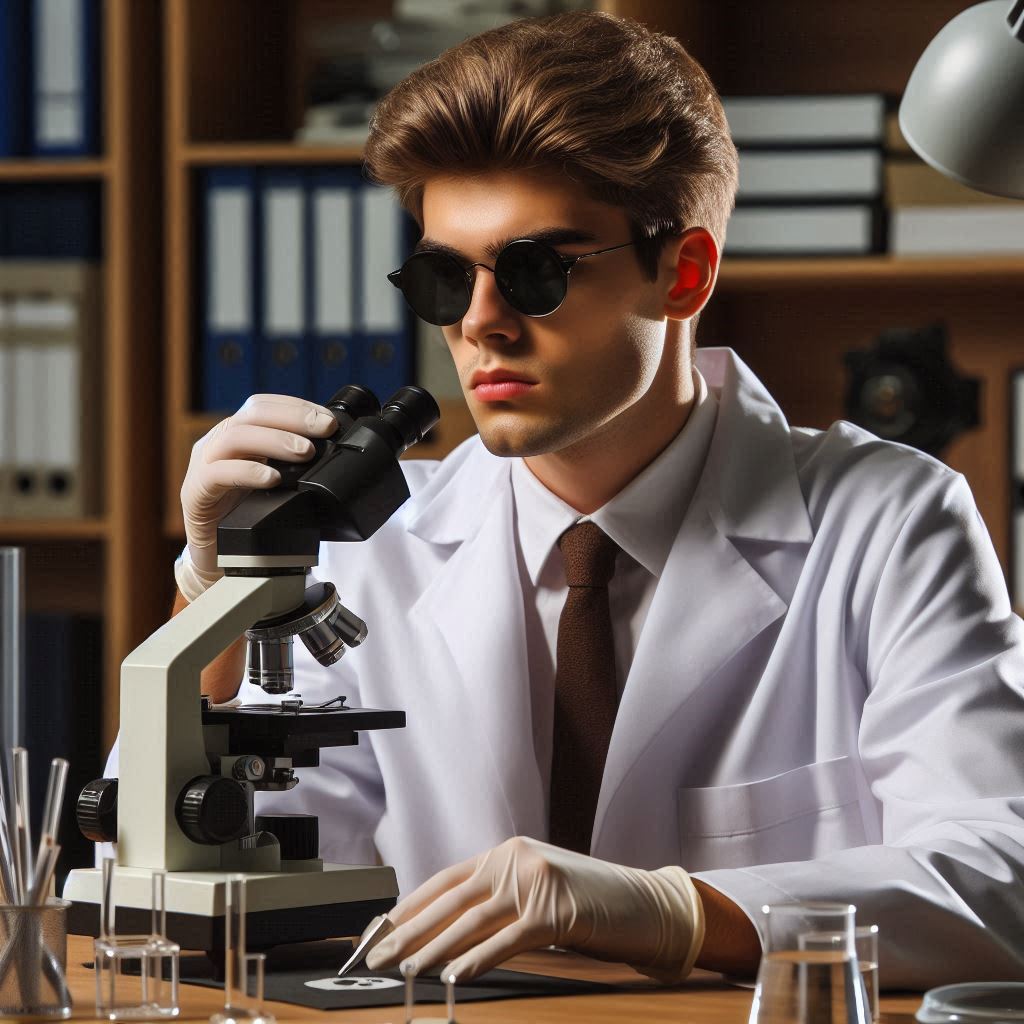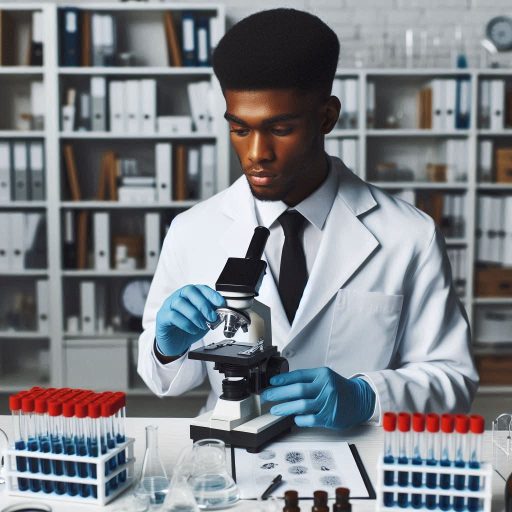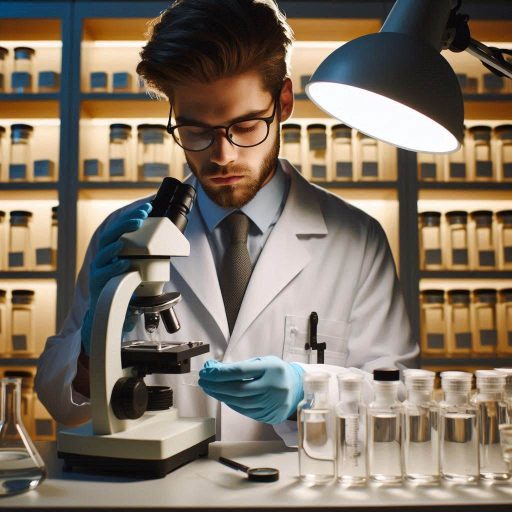Introduction
Forensic science certifications and licenses validate a professional‘s skills and knowledge in the field.
These credentials signify that individuals have met specific educational and experiential standards.
They provide assurance to employers and the public regarding a forensic scientist‘s competence.
Certifications and licenses play a critical role in forensic science.
They enhance the credibility of forensic professionals and promote trust in their findings.
Additionally, they ensure adherence to industry standards and ethical practices.
Without proper certification or licensing, the integrity of forensic evidence may be compromised, impacting criminal justice outcomes.
Various types of certifications and licenses exist in the forensic science field.
Professional organizations offer certifications that specialize in different forensic disciplines.
These disciplines include crime scene investigation, forensic biology, and forensic toxicology.
Each certification has unique requirements, including exams and continuing education credits.
Licensing requirements vary by jurisdiction and may involve comprehensive examinations.
Some states mandate licensure for certain forensic professions, ensuring practitioners meet established criteria.
This licensing process helps maintain high standards across the industry.
In this blog post, we will explore several key certifications and licenses relevant to forensic science.
We will examine the process of obtaining certifications and the benefits they provide.
Additionally, we will discuss the various organizations that offer these credentials and their significance in professional development.
Certification vs. License
Differentiate between certification and license in the context of forensic science
In forensic science, understanding the distinction between certification and licensure is crucial for professionals.
Certification is a voluntary process that validates a person‘s knowledge and skills in a specific area.
It often involves passing an examination and meeting educational requirements.
For example, the American Board of Criminalistics offers certifications in areas like criminalistics and toxicology.
These certifications enhance a professional’s credibility and demonstrate a commitment to ongoing education.
Licensure, on the other hand, is typically a mandatory credential required by state or local governments.
Licensure ensures that professionals meet specific standards and regulations to practice in their field.
Forensic scientists often need licenses to legally perform certain tasks, such as operating specific equipment or providing expert testimony in court.
The requirements for licensure can vary widely from one jurisdiction to another.
Significance of Certifications and Licenses
Obtaining both certification and licensure is vital for forensic science professionals.
Certification showcases expertise and dedication to the field.
It also increases employability and potential for career advancement.
Employers often prefer candidates with certifications because they indicate a higher level of competency.
Licensure, however, is essential for practicing legally in many areas.
It provides a safeguard for the public by ensuring that only qualified individuals can perform specific tasks.
Examples of Certifications and Licenses
Examples of commonly required certifications in forensic science include the following:
- Certified Forensic Consultant (CFC): This certification demonstrates expertise in forensic science consulting.
It requires passing a comprehensive exam and having relevant work experience. - Forensic DNA Analyst Certification: Offered by the American Board of Criminalistics, this certification recognizes professionals specializing in DNA analysis.
Candidates must meet educational and experiential criteria and pass an exam. - Certified Latent Print Examiner (CLPE): This certification is for professionals who analyze fingerprints and other latent prints.
It demonstrates a mastery of fingerprint examination techniques.
In terms of licenses, many states require forensic scientists to have specific credentials to practice.
For example, a forensic toxicologist may need a license to operate toxicology testing equipment.
Similarly, forensic psychologists often require licenses to conduct psychological evaluations and provide expert testimony.
Each state has its own licensing requirements, so professionals must research the rules that apply in their jurisdiction.
In review, understanding the difference between certification and licensure is vital for success in forensic science.
Professionals should aim to obtain both credentials to enhance their qualifications and practice legally.
These credentials not only bolster individual careers but also contribute to the integrity of the forensic science field.
Read: Challenges and Rewards: The Dual Life of an U.S. Environmental Scientist
Types of Forensic Science Certifications
Forensic science offers a range of certifications, allowing professionals to specialize and advance their careers.
Below are some of the most recognized types of forensic science certifications available.
Different Types of Certifications Available in Forensic Science
- Certified Crime Scene Investigator (CCSI): The International Association for Identification (IAI) offers the CCSI certification.
This certification emphasizes crime scene processing, evidence collection, and photography. - Forensic Certified Investigator (FCI):The International Association of Forensic Investigators (IAFI) offers the FCI certification.
This certification demonstrates proficiency in forensic investigations. - Diplomate of the American Board of Forensic Engineering and Technology (DABFET):This certification is ideal for forensic engineers.
It shows their expertise in applying engineering principles to legal cases. - Certified Forensic Accountant (Cr.FA): This certification, offered by the American Board of Forensic Accounting, focuses on forensic accounting and fraud investigation.
- Certified Digital Forensics Examiner (CDFE): This certification helps digital forensics professionals validate their skills.
It focuses on recovering and analyzing digital evidence effectively.
The Requirements and Eligibility Criteria for Each Certification
- Certified Crime Scene Investigator (CCSI):Candidates need a high school diploma and three years of relevant experience.
Alternatively, they can qualify with a bachelor‘s degree and two years of experience. A comprehensive examination is required. - Forensic Certified Investigator (FCI): Candidates need at least five years of experience in forensic investigations and must complete a detailed application.
Passing a specialized examination is also required. - Diplomate of the American Board of Forensic Engineering and Technology (DABFET): To qualify, applicants need at least eight years of forensic engineering experience.
They must also hold an engineering degree. Additionally, candidates must pass a written exam. - Certified Forensic Accountant (Cr.FA): Candidates must hold a bachelor‘s degree in accounting or finance.
They need two years of relevant experience. Additionally, they must pass an exam on forensic accounting principles. - Certified Digital Forensics Examiner (CDFE): Applicants must have a background in computer science or a related field.
Completing specific training courses and passing an examination is mandatory.
Benefits of Obtaining Specific Certifications for Career Advancement
Obtaining these certifications offers numerous benefits.
They enhance your credibility and demonstrate your commitment to the field.
Certified professionals often enjoy better job prospects and higher salaries.
Certifications can lead to promotions and specialized roles within organizations.
Moreover, they help you stay updated on industry trends and best practices, ensuring continued professional development.
Pursuing the right certification can significantly enhance your career and professional reputation in forensic science.
Read: Job Market Trends: Future of Chemistry Jobs in America
Popular Certifying Bodies
In the field of forensic science, obtaining certifications from recognized certifying bodies can enhance a professional’s credentials.
These certifications signify a commitment to maintaining high standards in forensic practices.
Various organizations offer these certifications, but some are more widely recognized than others.
Well-Known Certifying Bodies in Forensic Science
The American Board of Criminalistics (ABC) is a prominent certifying body.
It specializes in various forensic disciplines, including trace evidence and toxicology.
ABC‘s certification process involves a comprehensive examination.
Candidates must demonstrate their knowledge and skills in criminalistics.
Achieving ABC certification often opens doors to advanced job opportunities.
Another significant organization is the International Association for Identification (IAI).
This body offers certifications in areas such as fingerprint analysis, crime scene investigation, and digital evidence.
The IAI‘s accreditation process is rigorous.
Candidates must fulfill specific educational requirements and pass written and practical examinations.
Additionally, IAI certifications require ongoing education to ensure professionals stay current in the field.
The American Academy of Forensic Sciences (AAFS) also plays a vital role.
Although AAFS does not offer certifications, it provides a platform for professionals to gain recognition.
The AAFS has various sections that focus on different forensic disciplines.
Members benefit from networking, educational resources, and access to the latest research.
This organization encourages continuous professional development.
The Accreditation Process for Certifying Bodies
The accreditation process for certifying bodies involves several steps.
First, organizations must establish standards for certification.
These standards typically include educational qualifications, work experience, and examinations.
Certifying bodies then undergo peer review to ensure their standards meet industry needs.
Once accredited, these bodies must continually evaluate their processes to maintain credibility.
Why It Is Important for Professionals to Choose Certifications from Reputable Organizations
Choosing certifications from reputable organizations is crucial for several reasons.
First, recognized certifications enhance a professional’s credibility.
Employers often prefer candidates with certifications from established bodies.
These certifications indicate a commitment to quality and ethics in forensic practice.
Second, reputable organizations provide ongoing education and resources.
Professionals with these certifications stay informed about advancements in forensic science.
They can adapt to new techniques and technologies in the field.
This adaptability is vital in a rapidly evolving discipline.
Finally, certifications from well-known bodies often lead to better job prospects.
Many employers actively seek candidates with recognized credentials.
By obtaining certifications from respected organizations, professionals can distinguish themselves in a competitive job market.
In essence, obtaining certifications from well-known certifying bodies is essential for forensic science professionals.
Organizations like ABC, IAI, and AAFS uphold high standards that benefit the field.
Choosing reputable certifications ensures credibility, continuous education, and better job opportunities.
These factors contribute to a successful career in forensic science.
Read: Challenges and Rewards: Navigating the Chemist Career Path

Steps to Obtaining Certifications
Forensic science certifications enhance professional credibility and expertise.
Obtaining these certifications involves a clear process.
Here are the essential steps professionals should follow.
The General Steps
First, identify the certification you wish to pursue.
Several organizations offer certifications, including the American Academy of Forensic Sciences (AAFS) and the International Association for Identification (IAI).
Research the requirements for each certification to determine which aligns with your career goals.
Some certifications focus on specific areas, such as forensic biology or digital forensics.
Next, ensure you meet the eligibility criteria.
Most certifications require a relevant degree, practical experience, or a combination of both.
Some organizations offer different levels of certification, allowing professionals to advance their credentials as they gain experience.
Review the specific prerequisites for the certification you choose to ensure you qualify.
Once you have determined your eligibility, prepare for the certification exam.
Utilize study guides and review courses available online.
Many professional organizations provide resources tailored to their certification programs.
Joining a study group can also enhance your understanding of key concepts.
Engaging with peers helps clarify complex topics and provides motivation.
Tips and Resources for Preparing for Certification Exams
Practice exams are another valuable preparation tool.
These simulate the actual exam environment, helping you become familiar with the format and types of questions.
Analyze your performance on practice tests to identify areas needing improvement.
Focusing your studies on these areas increases your chances of passing the certification exam.
After passing the exam, complete any additional requirements for certification.
This may include submitting proof of education and experience.
Some organizations require a background check or references.
Ensure you have all required documents ready to avoid delays in processing your application.
The Renewal Process for Maintaining Certifications
Once certified, understand the renewal process.
Most certifications have a validity period, typically ranging from three to five years.
Renewal often requires continuing education credits to ensure professionals stay current with advancements in the field.
Check the specific renewal requirements for your certification.
Participating in workshops, webinars, and conferences can help you accumulate the necessary credits.
Many professional organizations offer opportunities for networking and learning.
Engaging in these activities not only fulfills renewal requirements but also enhances your professional development.
In fact, obtaining forensic science certifications involves identifying the right certification, meeting eligibility criteria, preparing for exams, and understanding the renewal process.
Following these steps will enhance your qualifications and advance your career in forensic science.
Utilize available resources to stay informed and prepared for certification and renewal processes.
Read: Diverse Career Paths: From Chemist to Patent Attorney in the US
Types of Forensic Science Licenses
Different Types of Licenses Required for Forensic Science Professionals
Forensic science professionals need specific licenses to work legally in their field.
Here are five key licenses and their requirements:
Transform Your Career Today
Unlock a personalized career strategy that drives real results. Get tailored advice and a roadmap designed just for you.
Start NowCrime Scene Investigator (CSI) License
A CSI license allows professionals to gather and analyze evidence from crime scenes.
Most states require coursework, hands-on training, and passing a state exam to earn this license.
The license ensures competency in evidence collection, forensic photography, and crime scene processing.
Forensic Toxicologist License
Forensic toxicologists analyze substances in biological samples.
Earning this license involves advanced education in chemistry or biology, toxicology lab experience, and certification by relevant boards.
This ensures standardization in testing and reliability in court.
Forensic Pathologist License
A forensic pathologist license is essential for professionals who perform autopsies to determine cause of death.
Candidates must have a medical degree, pathology residency, and pass the American Board of Pathology (ABP) certification exam.
This license allows them to testify as experts in court.
Latent Print Examiner License
Latent print examiners require specialized training in fingerprint identification.
They must pass exams like those from the International Association for Identification (IAI).
Licensure ensures adherence to strict protocols in collecting and comparing fingerprints for criminal investigations.
Forensic Odontologist License
Forensic odontologists analyze dental evidence to identify victims or suspects.
They need a dental degree plus training in forensic odontology.
Licensure is critical to ensure proper legal testimony and accurate identification methods.
Differences Between State-Specific and National Licenses
Licensing requirements vary between state-specific and national licenses.
State-specific licenses allow forensic professionals to practice only within that state’s jurisdiction.
They usually involve passing state exams and adhering to local rules.
National licenses, however, are recognized across multiple states or regions.
National bodies such as the American Board of Forensic Toxicology (ABFT) or American Board of Pathology (ABP) issue these licenses.
These licenses provide more flexibility for professionals to work in different areas.
The Importance of Obtaining Licensure for Practicing Forensic Science
Obtaining licensure is vital for forensic science professionals.
Licenses prove a candidate’s expertise and adherence to ethical and legal standards.
Without licensure, individuals cannot practice forensics legally, testify in court, or earn credibility in their field.
Additionally, licensure helps protect the integrity of forensic work by ensuring that only qualified individuals perform critical tasks that influence legal outcomes.
In forensic science, where even minor errors can affect legal cases, licensure upholds the quality of work and maintains public trust in forensic evidence.
Explore Further: Top Universities for Seismology Studies in the USA
Licensing Requirements by State
An overview of the licensing requirements for forensic science professionals in different states
Licensing requirements for forensic science professionals differ across the United States.
While some states mandate formal licensing, others have no specific regulations.
States such as California and Texas require forensic science professionals to meet specific standards, including education and examinations, to obtain a license.
This ensures that individuals handling forensic evidence are trained to uphold the highest standards of accuracy and reliability.
In contrast, states like New York and Florida do not require formal licenses, though certifications from professional organizations are often highly valued.
Variations or specific requirements for obtaining licenses in certain states
Licensing requirements also vary depending on the forensic science specialty and the state’s regulations.
For instance, California mandates a science-related degree and practical experience in forensic laboratories.
While Texas requires professionals to pass the Forensic Analyst Licensing Exam.
Some states, like Virginia, impose stricter regulations for certain specialties, such as forensic toxicology, requiring compliance with both state and federal guidelines.
These variations make it important for professionals to be aware of the specific criteria for the forensic field they intend to enter, especially if moving between states.
How professionals can stay informed about state-specific licensing regulations
Forensic science professionals should regularly consult state licensing boards and forensic science associations.
This practice helps them stay informed about state-specific licensing requirements.
State government websites provide updates on licensing procedures and qualification standards.
Joining industry organizations like the American Academy of Forensic Sciences (AAFS) benefits professionals.
These organizations provide valuable resources and information on changing regulations.
Networking with colleagues and attending forensic science conferences are additional ways to stay current on state-specific changes.
By maintaining awareness and actively seeking updates, professionals ensure compliance with licensing requirements and improve career opportunities.
Conclusion
In this blog post, we explored the vital role of certifications and licenses in forensic science.
We explored several certifications professionals can earn.
These include credentials from recognized organizations like the American Board of Criminalistics and the International Association for Identification.
These credentials enhance a professional’s credibility and demonstrate their commitment to the field.
We emphasized how certifications provide forensic scientists with specialized knowledge and skills.
Such qualifications enable them to perform complex analyses and present findings in legal settings.
Moreover, licensing requirements often vary by state or jurisdiction, making it essential for professionals to stay informed about local regulations.
The importance of certifications cannot be overstated.
They serve as a benchmark for competency in forensic science.
Employers often prioritize candidates with relevant certifications during the hiring process.
Furthermore, certifications can lead to greater job opportunities and career advancement within the field.
Professionals with advanced qualifications typically earn higher salaries and have increased job security.
We encourage all forensic science professionals to pursue additional certifications and licenses.
Continuous education and professional development are crucial in this rapidly evolving field.
Engaging in workshops, seminars, and training programs can help professionals stay updated with the latest advancements.
Networking with peers and joining professional organizations can also provide valuable resources and support.




